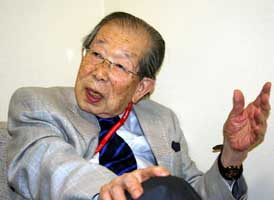 Shigeaki Hinohara
Shigeaki Hinohara縲 Mr. Hinohara was born on October 4, 1911 in his maternal grandparents窶・home in the city of Yamaguchi. After graduating from the faculty of medicine of Kyoto University, he began working as a physician at St. Luke窶冱 International Hospital in 1941. He subsequently became director of the hospital. In 2005, he received the Order of Culture. His father Zensuke served as principal of Hiroshima Jogakuin from 1930 to 1942. During his student days, Mr. Hinohara窶冱 family lived in Hiroshima. He now lives in Setagaya Ward, Tokyo.
|
Adults insist on keeping their nuclear weapons, as well as their armies and other weapons, knowing full well that war claims many lives. It could be said that they prefer fighting one another to talking together.
Young people like you must tell these adults: "Children can be the strongest force in making the world a more peaceful place." Children who love peace, particularly the children of Hiroshima, which was destroyed by the atomic bomb, should join hands with children everywhere. Because the Japanese people have personal experience of the atomic bombings, we can be persuasive when we say, "Stop holding onto your nuclear weapons and killing one another." I want you to believe that you can help create a peaceful world, something adults haven't been able to do, and draw up concrete ideas for making this a reality.
While you are still in your teens, I'd like you to help build peace. Please keep in mind that what you do to build peace is something that begins in your childhood.
Would you tell us about your memories of your childhood and your connection to Hiroshima?
My father was the principal of Hiroshima Jogakuin, a girls' school. I went to high school in Kyoto and spent the holidays at my parents' home in Hiroshima. I enjoyed swimming in the Otagawa River.
When I was a student at Kyoto University, I came down with tuberculosis. For more than six months, I had a fever of 39 degrees and I became bedridden. I couldn't even make my way to the bathroom. During this time, I asked my younger sister to turn on the gramophone and I would jot down the melodies I heard. After I became well enough to walk around the house, I began playing the piano and writing my own music. Music was a big part of my upbringing and became a lifelong joy. These youthful days spent in Hiroshima are the basis for my understanding of the pain my patients feel.
Before the atomic bombing, my father had retired and we moved to Tokyo. But just after the blast, he returned to Hiroshima to search for students and teachers from his school. As a result, he was exposed to the bomb窶冱 radiation.
What are your thoughts on the big earthquake that struck eastern Japan on March 11?
One Japanese man was swallowed up by the tsunami after helping some Chinese trainees to evacuate. At the same time, the whole world has come to Japan窶冱 aid. We can see the power of love in these examples. If that feeling of love can spread more widely, human beings could come to the shared sentiment that we will not resort to war. I hope children will help make that happen.
So that elementary school children can understand the preciousness of life and peace, you have developed "life lessons," one lesson per day over a period of 10 days. What does "life" mean to you?
Understanding the preciousness of life will dissuade a person from harming the life around them. That would lead to eradicating bullying, which causes pain to the hearts of others. Even if someone strikes you, don't strike them back. Instead, endure such times with patience and turn the other cheek by inviting them to play soccer with you on the school playground. If the society would refrain from retaliating, this would encourage nations to stop waging war.
What can we do to promote peace in the world?
It's important to experience life abroad, such as having a homestay with a family in another country. Please learn to speak English, which is vital for interacting with people abroad. That might even help you land a job in another country and marry and raise a family there. While enjoying an international lifestyle in a new marriage, it's still important, I think, to embody the proper traditional culture of Japan.
(Minako Iwata, 18, Miyu Sakata, 15, Kanna Inoue, 16, Junichi Akiyama, 15, and Yumi Kimura, 15, photo taken by Knna Inoue)
|